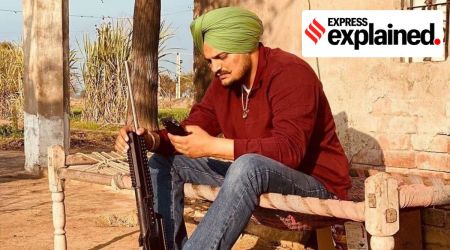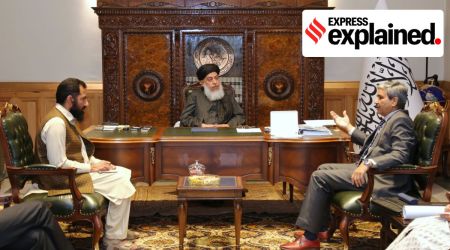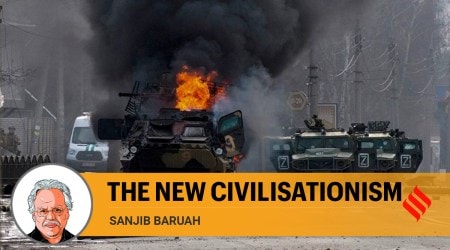Review disability quota immunity of IPS, 2 other forces: SC to Central government

The Supreme Court has asked the Centre to have a re-look at the blanket exemption given to the Indian Police Service (IPS), DANIPS and IRPFS from the onus of reserving posts for persons with disabilities under the Rights of Persons With Disabilities Act, 2016.
The top court’s order came after the government, in an affidavit, stated that people with benchmark disability — disability of more than 40% — are not considered for any post in the three services, given the nature of their work.
Besides the IPS, NCT of Delhi, Andaman and Nicobar Islands, Lakshadweep, Daman and Diu and Dadra and Nagar Haveli Police Service (DANIPS) and the Indian Railway Protection Force Service (IRFPS) are also exempted from making such reservation.
During the hearing of the matter on May 19, Attorney General K K Venugopal also expressed the view that the “affidavit perhaps needs a relook”.
The court was hearing a petition by the National Platform for the Rights of the Disabled, which had challenged the notification by the Department of Empowerment of Persons With Disabilities (DEPWD), under the Ministry of Social Justice and Empowerment, granting exemption from reserving posts to Persons with Benchmark Disabilities in the three services.
The DEPWD is the competent authority to exempt any Central government post or service from the purview of reservation under the Act.
Requests from Central government establishments seeking exemption from the purview of the Act are considered by an Inter-Departmental Committee (IDC), headed by Joint Secretary of the department, which was constituted on August 16, 2017.
Hearing the matter, an SC bench presided by Justice A M Khanwilkar agreed with the submission of senior counsel Arvind Datar that IDC, in its August 13, 2021 meeting to discuss the MHA’s request seeking exemption from the reservations, did not discuss all categories of disability, “including [those] relating to the feasibility of appointment to non-combative posts”.
“In such a situation, it is appropriate that the Committee must examine the matter afresh,” the court said. “While doing so, it ought to take into account the recommendations made by the experts and also the additional note to be furnished by the petitioner.”
What the law says
Section 33 of the Act mandates the government to identify posts that can be held by various categories of persons with benchmark disabilities. Section 34(1) of the Act provides for reservation of not less than 4% in government jobs to identified categories of persons with benchmark disability — people with disability of 40% or more.
On March 25, 2022, the SC had allowed candidates with physical disabilities, who have cleared the civil services written exam, to provisionally apply for selection to the three services and said that their claims can be considered, subject to the outcome of the case.
In an affidavit filed in the court after this, the Centre pointed out that “the proposal of exemption of IPS/DANIPS/IRPFS has been examined at length at the level of” the “Inter-Departmental Committee…Expert Committee constituted by Ministry of Home Affairs (MHA) and by Director General of Health Services (DGHS)”. The April 21 affidavit said, “it may be noted that IPS, DANIPS and IRPFS are dealing with security establishments. It is therefore essential to maintain the highest standard of physical as well as mental fitness alertness all the time”.
It said the IDC had first discussed the MHA’s request seeking exemption in April 2018, and advised it to revisit it in light of the fact that the benefit of reservation was extended to new categories of persons with benchmark disabilities such as specific learning disabilities, acid attack victims, etc.
? Limited Time Offer | Express Premium with ad-lite for just Rs 2/ day ?? Click here to subscribe ?
The MHA again requested to exempt IPS from the purview of the Act “in the larger interest of service”, outlining duties and functions of officers and preparedness to perform their duty through rigorous physical training conducted at Sardar Vallabhai Patel National Police Academy (SVPNPA). But the ministry was once again asked to revisit it and consider indenting posts for acid attack victims.
An in-house expert committee set up by MHA, however, said this was “not desirable” given the long-term medical effects vis-a-vis the role expected of the officers.
The MHA put in a fresh request, which was discussed by IDC. The committee then recommended to the department to decide it in consolation with the Ministry of Health and Family Welfare.
Following this, the DGHS agreed with the MHA’s request, after which the IDC again discussed it and agreed to exempt IPS, DANIPS and IRPFS posts from the purview of reservation for persons with benchmark disabilities under the Act.
The government affidavit said that a “person with benchmark disability will not be able to do full justice with the role and responsibilities assigned to an IPS officer. As leaders of the civil and central armed forces, IPS/DANIPS officers handle issues of public order and safety impinging upon the internal security of the country, hence infirmity in carrying out these duties can and will cause avoidable loss of life and property. In the similar manner, such reservation would not be acceptable for other ranks of the Central Armed Police Forces (CAPFs) and most of the state police units due to operational requirements and such persons, if appointed to IPS, would find themselves in a serious leadership deficit situation.”
It said that “even for acid attack victims amounting to impairment to body parts or persons with specific learning disabilities may not be helpful in carrying out day-to-day functioning of police work which requires high accuracy and alertness”.
The Centre’s affidavit stated: “The function of an IPS/DANIPS officer is not only limited to policing but [they] are also routinely required to handle field and sensitive work under adverse climatic conditions and tough geographical terrains. Given the nature of responsibility and expected outcome from the officers of the Indian Police Service, it is desirable that introduction of reservation based on benchmark disability may not be suitable for their appointment in the Indian Police Service.
“It is noteworthy to mention here that an IPS/DANIPS officer is not recruited against any classified post. Being an All India Service, they work in the state government and Central government as well. When they are posted in the State government, they are supposed to look after the law and order, VIP security, any urgent untoward situation involving law and order, public order or security of the State which cannot be compromised at any cost. When they are working in Central government, they are also posted in Intelligence Bureau (IB), Research and Analysis Wing (RAW), National Investigation Agency (NIA), National Disaster Relief Force, CAPF, etc, and have to lead the whole force from the front.”
Thus, the Centre submitted, “considering the tough nature of duties to be performed by them, there is no other option left but to grant exemption to the IPS/DANIPS/IRPFS as a whole from recruitment of Persons with Disability candidates in government establishment.”
It also said that “after joining the Indian Police Service and right from the time of probation, emphasis is laid on the acquisition and development of physical strengths and maintenance of high level of physical fitness and well-being in order to nurture an acuity of mind and body to deal with the challenges that they confront right from the first day in the service. Therefore, the arduous training in compulsory outdoor subjects as designed by SVPNPA, Hyderabad, after exhaustive Training Need Analysis (TNA) which is conducted in two phases, is oriented at achieving this goal”.
The government also said that the training module at SVPNPA “has been designed in such a manner that any technical assignments related to national security can be performed by an IPS officer assignment required the training module is generic and functional based and cannot be on the basis of pick and choose methodology. Any compromise with the training module will definitely endanger national security”.
The affidavit stated that since IPS is a technical service, all UPSC-qualified candidates “cannot be treated at par because for IPS officers, one has to meet the minimum physical standards which is not the requirement for the non-technical services recruited through UPSC”.





